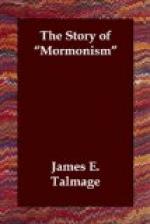The time-span of mortal life is but one stage in the soul’s career, separating the eternity that has preceded from the eternity that is to follow. And this mortal existence is one of the Father’s great gifts to his spiritual children, affording them the opportunity of an untrammeled exercise of their free agency, the privilege of meeting temptation and of resisting it if they will, the chance to win exaltation and eternal life.
We claim that all men are equal as to earthly rights and human privileges; but that each has individual capacity and capabilities; that in the primeval world there were spirits noble and great, as there were others of lesser power and inferior purpose. There is no chance in the number or nature of spirits that are born to earth; all who are entitled to the privileges of mortality and have been assigned to this sphere shall come at the time appointed, and shall return to inherit each the glory or the degradation to which he has shown himself adapted. The gospel as understood by the Latter-day Saints affirms the unconditional free-agency of man—his right to accept good or evil, to choose the means of eternal progression or the opposite, to worship as he elects, or to refuse to worship at all—and then to take the consequences of his choice.
“Mormonism” rejects what it regards as a heresy, the false doctrine of pre-destination as an absolute compulsion or even as an irresistible tendency forced upon the individual toward right or wrong—as a pre-appointment to eventual exaltation or condemnation; yet it affirms that the infinite wisdom and fore-knowledge of God makes plain to him the end from the beginning; and that he can read in the natures and dispositions of his children, their destiny.
“Mormonism” claims an actual and literal relationship of parent and child between the Creator and man—not in the figurative sense in which the engine may be called the child of its builder; not the relationship of a thing mechanically made to the maker thereof; but the kinship of father and offspring. In short it is bold enough to declare that man’s spirit being the offspring of Deity, and man’s body though of earthy components yet being in the very image and likeness of God, man even in his present degraded—aye, fallen condition—still possesses, if only in a latent state, inherited traits, tendencies and powers that tell of his more than royal descent; and that these may be developed so as to make him, even while mortal, in a measure Godlike.
But “Mormonism” is bolder yet. It asserts that in accordance with the inviolable law of organic nature—that like shall beget like, and that multiplication of numbers and perpetuation of species shall be in compliance with the condition “each after his kind,” the child may achieve the former status of the parent, and that in his mortal condition man is a God in embryo. However far in the future it may be, what ages may elapse, what eternities may pass before any individual now a mortal being may attain the rank and sanctity of godship, man nevertheless carries in his soul the possibilities of such achievement; even as the crawling caterpillar or the corpse-like chrysalis holds the latent possibility, nay, barring destruction, the certainty indeed, of the winged imago in all the glory of maturity.




